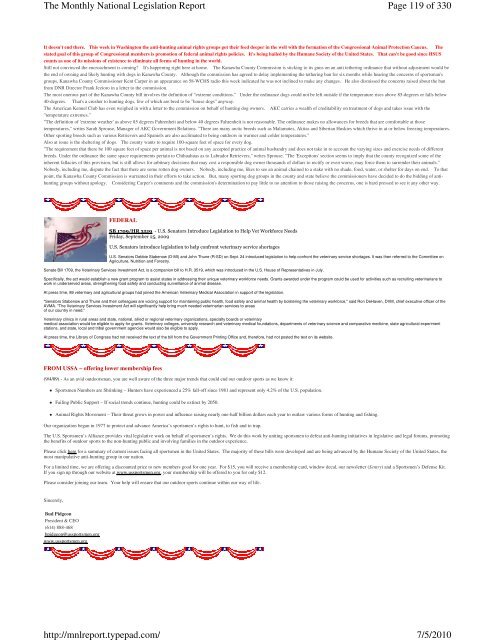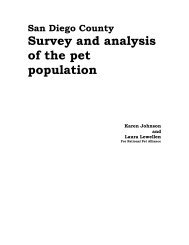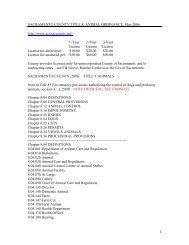<strong>The</strong> <strong>Monthly</strong> <strong>National</strong> <strong>Legislation</strong> <strong>Report</strong>http://mnlreport.typepad.com/<strong>Page</strong> 118 <strong>of</strong> <strong>330</strong>7/5/<strong>2010</strong>said a tail-docking ban would apply to all breeds and include working dogs. Some committee members, however, argued that many working dogs would damage their tails as a result <strong>of</strong> anyban. <strong>The</strong> department said it would consider the results <strong>of</strong> a scientific study in Britain on tail-docking before introducing the new legislation. A tail docking-ban has been introduced in Scotland,while in England and Wales it has left to vets to judge whether puppies being <strong>of</strong>fered for tail-docking were suitable candidates. <strong>The</strong> proposed ban in Northern Ireland would include making itan <strong>of</strong>fence to take a dog across the border for tail-docking.(10/8/09) - A ten-fold increase in the cost <strong>of</strong> a dog licence from £5 to £50 could lead to a rise in the number <strong>of</strong> abandoned dogs, Ian Paisley Jnr has said. <strong>The</strong> DUP MLA said sincethe planned increase was revealed he had been "inundated" by calls from dog owners. Mr Paisley said more dogs could be abandoned if owners were "unwilling or unable to meet thesecharges". "Furthermore, we strongly believe that there should be special measures for senior citizens," he said. <strong>The</strong> proposals go out to consultation next month and June <strong>2010</strong> is the targetdate for their introduction. <strong>The</strong> new Dog Control Order would also force owners to microchip their pets at a cost <strong>of</strong> £20-£30. For the first time there would be an <strong>of</strong>fence involving dog on dogattacks and will have to be kept on leads in public places. Mr Paisley, who is the chair <strong>of</strong> the Stormont Agriculture Committee, said he had been lobbied by members <strong>of</strong> dog walking groups,who believe the new laws would actually have "a detrimental impact not only on dog owner responsibilities, but also on those people who would find themselves unable to pay these newlicensing charges". He said there were parts <strong>of</strong> the laws he would support, which deal with the safety <strong>of</strong> the public and dog owners themselves, especially against aggressive dogs.Agriculture Minister Michelle Gildernew said that the current fee was simply too low. "It is widely acknowledged as being too low, it doesn't send out a signal <strong>of</strong> responsible dog ownership andit doesn't give councils the resources they need to properly control any dog related issues," she said. She said they have suggested exemptions for elderly people, those on low incomes anddiscounts for neutered animals. Ms Gildernew added that for some elderly people in isolated areas a dog was a "necessity" and helped guard them. "This, for me, is about tackling the peoplewho have dogs who use them as a method <strong>of</strong> control and who have dogs that are maybe intimidating people in a housing estate or an area and trying to ensure responsible dog ownership,"she said. <strong>The</strong>re is no dog licensing scheme in the rest <strong>of</strong> the UK and in the Republic a license costs 12 euros.NEW ZEALANDManawatu – (10/23/09) - Local Government Minister Rodney Hide announced a review <strong>of</strong> the Dog Control Act last week. However, Mr Hide, a proponent <strong>of</strong> more freedom for responsibledog owners said that a review <strong>of</strong> the Act is not a priority and is still a couple <strong>of</strong> years away. Spokesperson for Local Government New Zealand Dianne Hale said that dog laws are highlyemotive for many people. "Protecting the public from dangerous dogs should be at the forefront <strong>of</strong> a review <strong>of</strong> the Dog Control Act," she said. "It's the irresponsible owners that raise theirdogs to be aggressive, and don't take the necessary steps to protect the public that can give all dogs owners a bad name." Mr Hide said that everything across the board will be looked at,such as whether micro-chipping works, banning dangerous breeds and even licensing owners. "<strong>The</strong>re is potential merit in investigating targeted licensing <strong>of</strong> owners who have committed<strong>of</strong>fences under the Act or high-risk <strong>of</strong>fenders that are not being dealt with through the Courts," said Mrs Hale. <strong>The</strong>re is still criticism <strong>of</strong> the micro-chipping legislation which has proved avaluable tool in reuniting dogs with their owners, however questions remain as to it's effectiveness in protecting the public from dangerous dogs. Local Government New Zealand welcomednews <strong>of</strong> the review and is looking forward to considering its role in any decision making.RUSSIAIvanov - (10/21/09) - Moves to ban animal cruelty in RussiaHundreds <strong>of</strong> animals are being forced to perform death-defying stunts at packed circuses in Russia, where there are no laws to ban animal cruelty. <strong>The</strong> Zapashny Brothers' Circus in Ivanov,is located near Moscow, where the lions and tigers are the main attraction and thousands flock to see them. Circuses like this attract huge crowds, in contrast with Europe where theintroduction <strong>of</strong> animal welfare laws has outlawed shows in most countries. In Russia, there are over 300 animals performing in circuses and there is little or no opposition to it. <strong>The</strong> few inRussia who oppose the use <strong>of</strong> animals in entertainment have a tough quest. VITA is a Moscow based animal welfare charity. Its president, Irina Novozhilova, said 'People's conscience is notat the level where they see circuses as cruel. 'To the contrary, there is a belief here in Russia that children need to be taken to circus so they are taught how to love animals. 'But circusescannot teach you anything. Children are seeing slaves, not animals.' An average <strong>of</strong> 20,000 people a week attend the circus we visited. As long as the audiences keep coming, the animals willkeep performing.Siberia – (10/18/09) - Tiger success story turns bleak: poachers decimating great cats in Siberia Jeremy Hance, mongabay.com<strong>The</strong>re were two bright spots in tiger conservation, India and Russia, but both have dimmed recently. Last year India announced that a new survey found only 1,411 tigers, instead <strong>of</strong> theprevious estimation <strong>of</strong> 3,508, and now Russian tigers may be suffering a similar decline. <strong>The</strong> Siberian Tiger Monitoring Program—a collaboration between the Wildlife Conservation Society(WCS) and several Russia government organizations—has found evidence that after a decade <strong>of</strong> stability the Amur tiger's (popularly known as the Siberian Tiger in the west) population maybe falling. This year's annual survey, which covers only a portion <strong>of</strong> tiger habitat in Russia, found only 56 adult tigers: a forty percent decrease from the average <strong>of</strong> 95 tigers. While the cause<strong>of</strong> this year's decline may be weather-related, researchers fear something far more insidious is going on. Amur tigers are poached for the lucrative black market in tiger parts, including tigerskins, meat, and other body parts for use in traditional Chinese medicines, even though the effectiveness <strong>of</strong> these medicines has never been proven. Amur tigers (Panthera tigris altaica) arethe largest tiger subspecies, making it the largest cat in the world. From 1995 to 2005 the Amur tiger population had remained steady while most other subpopulations suffered declines. In2005 the last survey <strong>of</strong> the whole Amur tiger population found 428-502 tigers. This has made Siberian tiger conservation a cause for celebration—until now. Three subspecies <strong>of</strong> tiger alreadyvanished in the 20th Century: the Javan, the Balinese, and the Caspian tiger.TAIWANTaipei – (10/19/09) - <strong>The</strong> Taipei City government plans to enact laws to protect household pets by requiring ample living space and proper food, a newspaper said on Monday. <strong>The</strong> TaipeiMunicipal Institute for Animal Health is drafting the bill on raising pets, which would become effective if passed by the Taipei City Council. <strong>The</strong> bill, based on a similar bill adopted in Japan,would set specific requirements for raising pets and outline penalties for violations. It would set rules on raising pets, such as outlining enough living space and proper food and drink for pets,the daily said. "<strong>The</strong> regulations will start with rules on raising dogs and cats, and later be expanded to other pets," Yen Yi-feng, director <strong>of</strong> the institute, was quoted as saying. "We will inviteconservation experts, veterinarians and scholars to design rules like how much time a dog owner should spend walking the dog, and what is the proper food and drink for the pet," he said.<strong>The</strong> institute also plans to print a guide for pet owners to teach them how to raise pets, he added. However, some Taipei residents fear that if the regulations are too strict, some pet ownersmight abandon their pets. Taipei pet owners have registered some 129,000 dogs and cats with the animal health institute, accounting for 82 per cent <strong>of</strong> the dogs and cats in Taipei City.However, there are tens <strong>of</strong> thousands <strong>of</strong> stray dogs and cats on Taipei streets, most <strong>of</strong> which were purchased as pets but were abandoned when they grew old or became ill.United Arab Emirates (UAE)Dubai - (10/8/09) - Dog owners who allow their animals to wander in prohibited areas such as shopping malls and beaches will be fined up to Dh500 (US$136), the municipality warnedyesterday. Fines will also be handed out to owners <strong>of</strong> dogs that are not wearing collars and masks, <strong>of</strong>ficials said as they extended a campaign to educate people about local pet laws.Hashem al Awadhi, the head <strong>of</strong> the veterinary services section, said pet owners were required to register and vaccinate their animals against common diseases, and carry health certificatesand vaccination records. He also said owners should purchase animals and birds only from places certified by the municipality.Comments (0) | TrackBack (0)October 05, 2009SEPTEMBER, 2009IN THE NEWS09/30/2009Hunting in the CrosshairsChris LawrenceCharleston, WVa.It would appear no matter where you look these days, the tradition <strong>of</strong> hunting that is so dear to so many <strong>of</strong> us here in West Virginia, is under a full frontal assault.<strong>The</strong> U.S. Senate has confirmed the nomination <strong>of</strong> Cass Sunstein to be the new White House "Regulatory Czar." Sunstein is known for his radical views on animal rights. He's previously proclaimed thatanimals should have the right to file lawsuits against human beings. He's also on the record as adamantly opposed to any and all forms <strong>of</strong> hunting.Although West Virginia is a strong hunting state, Senator Jay Rockefeller was with the majority in voting to confirm Sunstein's nomination. Rockefeller is even a member <strong>of</strong> the Congressional Sportsman'sCaucus. <strong>The</strong> CSC is a coalition <strong>of</strong> supposedly hunting friendly lawmakers who hang together when hunting is under assault. Rockefeller wasn't the only CSC member to bail on this one.Senator Byrd meanwhile was absent from the Sunstein vote.
<strong>The</strong> <strong>Monthly</strong> <strong>National</strong> <strong>Legislation</strong> <strong>Report</strong>http://mnlreport.typepad.com/<strong>Page</strong> 119 <strong>of</strong> <strong>330</strong>7/5/<strong>2010</strong>It doesn't end there. This week in Washington the anti-hunting animal rights groups got their feed deeper in the well with the formation <strong>of</strong> the Congressional Animal Protection Caucus. <strong>The</strong>stated goal <strong>of</strong> this group <strong>of</strong> Congressional members is promotion <strong>of</strong> federal animal rights policies. It's being hailed by the Humane Society <strong>of</strong> the United States. That can't be good since HSUScounts as one <strong>of</strong> its missions <strong>of</strong> existence to eliminate all forms <strong>of</strong> hunting in the world.Still not convinced the encroachment is coming? It's happening right here at home. <strong>The</strong> Kanawha County Commission is sticking to its guns on an anti tethering ordinance that without adjustment would bethe end <strong>of</strong> owning and likely hunting with dogs in Kanawha County. Although the commission has agreed to delay implementing the tethering ban for six months while hearing the concerns <strong>of</strong> sportsman'sgroups, Kanawha County Commissioner Kent Carper in an appearance on 58-WCHS radio this week indicated he was not inclined to make any changes. He also dismissed the concerns raised about the banfrom DNR Director Frank Jezioro in a letter to the commission.<strong>The</strong> most onerous part <strong>of</strong> the Kanawha County bill involves the definition <strong>of</strong> "extreme conditions." Under the ordinance dogs could not be left outside if the temperature rises above 85-degrees or falls below40-degrees. That's a crusher to hunting dogs, few <strong>of</strong> which are bred to be "house dogs" anyway.<strong>The</strong> American Kennel Club has even weighed in with a letter to the commission on behalf <strong>of</strong> hunting dog owners. AKC carries a wealth <strong>of</strong> creditability on treatment <strong>of</strong> dogs and takes issue with the"temperature extremes.""<strong>The</strong> definition <strong>of</strong> 'extreme weather' as above 85 degrees Fahrenheit and below 40 degrees Fahrenheit is not reasonable. <strong>The</strong> ordinance makes no allowances for breeds that are comfortable at thosetemperatures," writes Sarah Sprouse, Manager <strong>of</strong> AKC Government Relations. "<strong>The</strong>re are many arctic breeds such as Malamutes, Akitas and Siberian Huskies which thrive in at or below freezing temperatures.Other sporting breeds such as various Retrievers and Spaniels are also acclimated to being outdoors in warmer and colder temperatures."Also at issue is the sheltering <strong>of</strong> dogs. <strong>The</strong> county wants to require 100-square feet <strong>of</strong> space for every dog."<strong>The</strong> requirement that there be 100 square feet <strong>of</strong> space per animal is not based on any accepted practice <strong>of</strong> animal husbandry and does not take in to account the varying sizes and exercise needs <strong>of</strong> differentbreeds. Under the ordinance the same space requirements pertain to Chihuahuas as to Labrador Retrievers," writes Sprouse. "<strong>The</strong> 'Exceptions' section seems to imply that the county recognized some <strong>of</strong> theinherent fallacies <strong>of</strong> this provision, but is still allows for arbitrary decisions that may cost a responsible dog owner thousands <strong>of</strong> dollars to rectify or even worse, may force them to surrender their animals."Nobody, including me, dispute the fact that there are some rotten dog owners. Nobody, including me, likes to see an animal chained to a stake with no shade, food, water, or shelter for days on end. To thatpoint, the Kanawha County Commission is warranted in their efforts to take action. But, many sporting dog groups in the county and state believe the commissioners have decided to do the bidding <strong>of</strong> antihuntinggroups without apology. Considering Carper's comments and the commission's determination to pay little to no attention to those raising the concerns, one is hard pressed to see it any other way.FEDERALSB 1709/HR 3519 - U.S. Senators Introduce <strong>Legislation</strong> to Help Vet Workforce NeedsFriday, September 25, 2009U.S. Senators introduce legislation to help confront veterinary service shortagesU.S. Senators Debbie Stabenow (D-MI) and John Thune (R-SD) on Sept. 24 introduced legislation to help confront the veterinary service shortages. It was then referred to the Committee onAgriculture, Nutrition and Forestry.Senate Bill 1709, the Veterinary Services Investment Act, is a companion bill to H.R. 3519, which was introduced in the U.S. House <strong>of</strong> Representatives in July.Specifically, the act would establish a new grant program to assist states in addressing their unique veterinary workforce needs. Grants awarded under the program could be used for activities such as recruiting veterinarians towork in underserved areas, strengthening food safety and conducting surveillance <strong>of</strong> animal disease.At press time, 89 veterinary and agricultural groups had joined the American Veterinary Medical Association in support <strong>of</strong> the legislation."Senators Stabenow and Thune and their colleagues are voicing support for maintaining public health, food safety and animal health by bolstering the veterinary workforce," said Ron DeHaven, DVM, chief executive <strong>of</strong>ficer <strong>of</strong> theAVMA. "<strong>The</strong> Veterinary Services Investment Act will significantly help bring much needed veterinarian services to areas<strong>of</strong> our country in need."Veterinary clinics in rural areas and state, national, allied or regional veterinary organizations, specialty boards or veterinarymedical association would be eligible to apply for grants. Veterinary colleges, university research and veterinary medical foundations, departments <strong>of</strong> veterinary science and comparative medicine, state agricultural experimentstations, and state, local and tribal government agencies would also be eligible to apply.At press time, the Library <strong>of</strong> Congress had not received the text <strong>of</strong> the bill from the Government Printing Office and, therefore, had not posted the text on its website.FROM USSA – <strong>of</strong>fering lower membership fees(9/4/09) - As an avid outdoorsman, you are well aware <strong>of</strong> the three major trends that could end our outdoor sports as we know it:Sportsmen Numbers are Shrinking – Hunters have experienced a 25% fall-<strong>of</strong>f since 1981 and represent only 4.2% <strong>of</strong> the U.S. population. Failing Public Support – If social trends continue, hunting could be extinct by 2050.Animal Rights Movement – <strong>The</strong>ir threat grows in power and influence raising nearly one-half billion dollars each year to outlaw various forms <strong>of</strong> hunting and fishing.Our organization began in 1977 to protect and advance America’s sportsmen’s rights to hunt, to fish and to trap.<strong>The</strong> U.S. Sportsmen’s Alliance provides vital legislative work on behalf <strong>of</strong> sportsmen’s rights. We do this work by uniting sportsmen to defeat anti-hunting initiatives in legislative and legal forums, promotingthe benefits <strong>of</strong> outdoor sports to the non-hunting public and involving families in the outdoor experience.Please click here for a summary <strong>of</strong> current issues facing all sportsmen in the United States. <strong>The</strong> majority <strong>of</strong> these bills were developed and are being advanced by the Humane Society <strong>of</strong> the United States, themost manipulative anti-hunting group in our nation.For a limited time, we are <strong>of</strong>fering a discounted price to new members good for one year. For $15, you will receive a membership card, window decal, our newsletter (Sentry) and a Sportsmen’s Defense Kit.If you sign up through our website at www.ussportsmen.org, your membership will be <strong>of</strong>fered to you for only $12.Please consider joining our team. Your help will ensure that our outdoor sports continue within our way <strong>of</strong> life.Sincerely,Bud PidgeonPresident & CEO(614) 888-468bpidgeon@ussportsmen.orgwww.ussportsmen.org




